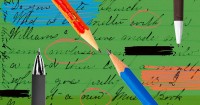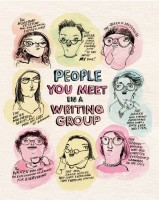
How These Writers Got a Literary Agent
thecut.com – Friday July 24, 2020

What do you do if you think the document you’ve been working on maybe, just maybe, might possibly be a book? There’s no one-size-fits-all answer, but for some writers, the next step is to look for a literary agent who will work to sell your manuscript to a publishing house and help guide your career from a business standpoint (typically for a fee of 15 percent). Below, eight writers explain how they connected with their literary agent.

So You Want to Write?
thecut.com – Wednesday July 22, 2020

When it comes to making it as a writer, there’s no magical shortcut to success: You just have to show up and keep doing the work. But there are some things that might be helpful to know and bits of wisdom to encourage you to keep going. Below, nine writers share what they wish they’d known and the advice they would give fledgling writers.

Writing Probably Won’t Pay the Bills
thecut.com – Tuesday July 21, 2020

It probably won’t shock you to hear that it can be difficult, if not downright impossible, to make a living as an author. Successfully selling a book doesn’t often lead to financial security, and the publishing industry hasn’t been known for its transparency on these subjects (which recent conversations like #PublishingPaidMe have worked to correct, specifically when it comes to racial inequities). In practice, making any kind of money as a writer can mean a million different things: holding down a full-time job and writing on the side, steadily applying for grants, cobbling together some combination of teaching and freelance writing gigs.
Below, six writers talk about how they make writing work financially.

Character Backstory?
By G. Miki Hayden
Instructor at Writer's Digest University online and private writing coach
firstwriter.com – Saturday July 4, 2020

One question that often arises for an author is what comes first, the protagonist’s backstory or an introduction to the character in action.
Well, the reader might not care about the protag’s history immediately, but a quarter of the way through the novel, once we readers have seen her in action—her heroism, her vulnerability, the sacrifices she makes for others—we might wonder how she came to be this way. Well, let the author finally tell us…

Effective Writing Advice That Is 100 Years Old
news.clearancejobs.com – Friday June 19, 2020

Regardless of your job, writing is an important communication skill that when fostered, improves over time. If you want to become a writer or improve your craft, I would highly recommend studying the techniques of a few of the American masters. While these men mostly wrote fictional books, they were strongly based on real events. Hemingway was also a correspondent over the years for many newspapers and magazines; his coverage of current events is worth a study as well. Below are some of the useful tips I took from a few of my favorite authors, and one editor who knew them all.

A deliciously cautionary tale about writing groups
ocregister.com – Tuesday June 16, 2020

Ask any writer how it’s going during quarantine, and they will respond, “Not much different than my regular life.” That’s how creativity works for writers. You hole yourself up in your house, plant your butt in your chair, stare at the computer screen, get up, pace the floors aimlessly trying to figure out the next scene, check the fridge for snacks, walk the dog 18 times a day waiting for ideas to come.
Or, if the writing is going well, you sit at your desk clattering away at the keyboard, telling your dog, “In a minute Mommy can take you for a walk. In a minute. Be a good dog.” When the writing is going well, a blessed day is when no delivery person rings the doorbell, no meetings have to be showered and dressed for, and no friend is suggesting you meet for happy hour because they have to tell you about their day. Not all writers love quarantine, but almost all self-quarantine to get the work done.
Writing is work and requires a time commitment and showing up – all the things that any job requires, even meetings. Meetings with agents and editors and psychotherapists. But even before publication, there are writing group meetings.

Want to Strike a Funny Bone?
By G. Miki Hayden
Instructor at Writer's Digest University online and private writing coach
firstwriter.com – Thursday June 4, 2020

My editing client’s (erotic romantic) writing made me genuinely LOL—laugh out loud— which naturally caused me to muse on humor in fiction. The world is going to hell in a handbasket (they lowered workers in handbaskets to set off dynamite while building the railways). But let’s not go all gloomy Gus over our trials and tribulations. Laugh, clown, laugh. Did I mix any metaphors?
Bookselling Requires a Great Query Letter & It's Harder Than It Looks
bleedingcool.com – Monday May 25, 2020
The query letter is a single page—usually closer to half a page—whose purpose is to explain who the writer is and what their book is about. As Hodapp says, the letter has one goal: to get the agent to request the full manuscript, "period." It's harder than it looks. Agents receive thousands of letters and only respond to a small fraction.
Hodapp spent time explaining so many ways a query can go right or wrong. She talked about "comps," or comparative titles, the one or two existing books that the author's book is most like. Sometimes authors are afraid to mention comps because they don't think the comparison is close enough, or they mention too many– just another example of a challenge the author has to navigate to get the agent's eye. She also talked about tone, how authors can let emotions curdle a letter into a sort of complaint email, which defies the purpose of trying to get a follow-up. Hodapp frequently presents on writing and querying, and her advice is invaluable.

How to write a novel in lockdown
goodhousekeeping.com – Saturday May 23, 2020

Summoning up the energy to be both creative and disciplined in order to make something meaningful is an enormous challenge at the best of times. All but the most robotic of writers are in a perpetual struggle to capture the novel that seemed so perfect when it was conceived, so writing well at a time when we are all distracted and anxious and pre-occupied seems even more daunting.
Writing is as much about stamina and discipline as it is about imagination and inspiration, so you need to put yourself in training. Every book is different, with its own unique set of problems, and it’s never easy (and nor should it be, like anything worthwhile) but after 21 novels, I’ve found a few tricks to keep me on track: a combination of routine, confidence-building and kindness.
Literary magazines are often the first place new authors are published. We can’t lose them
theconversation.com – Saturday May 16, 2020
Australia’s literary journals are produced in a fragile ecosystem propped up by a patchwork of volunteer labour, generous patrons and, with any luck, a small slice of government funding.
The Sydney Review of Books, the Australian Book Review and Overland were among a group of publications who sought four-year funding from the Australia Council in 2020 but were unsuccessful.
These publications join the ranks of many others – among them Meanjin and Island – defunded by state or federal arts funding bodies in recent years.
Get the free newsletter | Submit a news item or article | Get Writers' News for your website





